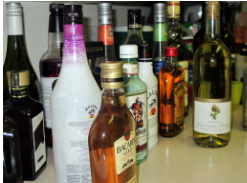How Can Alcohol Affect Your Brain?

November 18, 2021
Alcohol. We all know what it is. Maybe you’ve seen your parents drink some at a party or maybe you have seen your friends drink it, but do you really know how it affects you?
Drinking alcohol can affect you physically and mentally if you are still growing, which is why it is illegal for people to drink under the age of 21. Sadly, underage drinking is very common in the US. There are more than 3,500 deaths per year due to excessive drinking among people that are under 21 years of age. Drinking under-aged comes with multiple side effects. For example, it could affect grades and how you perform in school or could disturb your growth process. Drinking can affect your brain development and create long-term effects or memory loss.
Alcohol isn’t necessarily healthy for adults either. While having a drink once in and a while can’t cause serious health problems, heavy drinking could cause a lot. Alcohol affects the whole body but it can do a lot more to your brain. It slows down how the brain processes information and interferes with communication pathways, which is why when you are under the influence, you talk with slur. The way your body responds to alcohol depends on who you are. Your age, your gender, and your weight are all factors.
Excessive drinking can cause mental health problems such as anxiety and depression. Alcohol abuse can cause different cancers and possibly permanent brain damage. Abusing alcohol could cause something called Wernicke-Korsakoff syndrome (WKS) which is a “chronic memory disorder caused by severe deficiency of thiamine (vitamin B-1).”
Long-term alcohol abuse can lead to developing an alcohol use disorder (AUD) or alcoholism. This occurs when one is dependent on alcohol no matter the negative effects on mental health, physical health, or even close relationships with friends and family. You need to meet at least 2 symptoms on the criteria to be diagnosed with AUD by a mental health professional. 14.1 million adults ages 18 and older were diagnosed with AUD in 2018.
Symptoms of excessive drinking can go away after around a year of not drinking but most long-term effects don’t go away. If you think you know someone who has AUD or might be going in that direction, do your research first to see if they have symptoms. If they do, talk to them about it first because they might not know that they are drinking too much. Then if they are ready, send them a good rehab center or a number they can talk to. Try to help before it is too late.



